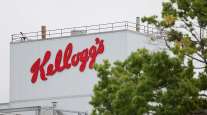J.B. Hunt Earnings Rise Less Than Expected

Higher profit from dedicated truckload business helped J.B. Hunt Transport Services Inc. to eke out a 1.5% second-quarter net income increase to $105.1 million, or 92 cents per share, but weaker than expected intermodal unit performance and other factors led the company to lower its 2016 earnings expectations.
Revenue rose 5% to $1.62 billion. Earnings in the prior-year period were $103.4 million, or 88 cents.
Earnings before interest and taxes at the dedicated unit rose 24% to $50.5 million with help from improved asset utilization, and the brokerage unit profit on that basis more than doubled to $10.9 million, led by a 62% rise in shipments managed. On the other hand, profits fell 11% at the truck-rail unit, Hunt’s largest business, because rail transport, driver and insurance costs increased.
The results trailed the 97 cents per share average estimate compiled in a Bloomberg analyst poll. Earnings comparisons were helped by a $14.1 million technology-related charge in the 2015 quarter, which reduced operating income to $173.7 million. Second-quarter 2016 operating income was $175.8 million.
Hunt, which ranks No. 4 on the Transport Topics Top 100 list of the largest U.S. and Canadian for-hire carriers, scaled back 2016 revenue growth expectations to 7% year-over-year from as much as 12%. Earnings before interest and taxes now are expected to rise 5%, down from 8% to 11%.
“The benefits of volume growth, increases in revenue producing truck counts and higher equipment utilization were substantially offset by increases in rail purchased transportation costs, higher driver wages and recruiting costs and increased equipment ownership costs,” the Lowell, Arkansas-based company said in a statement.
Its intermodal shipments rose 9% to 476,098, which represents about 13% of all U.S. intermodal loads. Revenue rose 3% to $933 million. The dedicated unit moved 8% more loads and boosted revenue by 4%. However, revenue per truck per week fell 0.8%. Dedicated revenue totaled $383 million.
At the brokerage unit, revenue rose 17% to $204 million, but the profit margin on shipments declined to 15% from 15.2% due to lower spot market rates and customer contract prices, the statement said. Hunt’s truck unit, the smallest business, raised revenue 1% to $98 million, but profits fell 9% due to lower rates.
Year-over-year, Hunt’s fleet was increased by 5%.
Based on six-month results, the new revenue and operating income targets suggest a continuation of first half performance, rather than the earlier expectation of a stronger second half of 2016.




